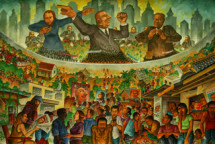Bulldozing like a fascist? Authoritarian populism and rural activism in Tanzania
Topics
Regions
Using the concept of authoritarian populism to describe the ongoing reforms in Tanzania.

Authors
This paper attempts to understand the changes taking place in Tanzania as a result of the 2008 global crisis of neoliberal capitalism. The Magufuli Presidency came to rescue capital much as it also co-opts some of the demands of lower classes. His economic vision, albeit capitalist, challenges the neoliberalism in its double manifestation as an ideology of recolonisation of peripheral countries and as a war on laboring classes. Magufuli has not been able to build a credible alternative but he has managed – in some cases – to reassert the country’s right to self-determination and renegotiate the terms of exploitation by multinational corporations.
While the presidency exhibits some nationalist elements, the Tanzanian state continues to be neoliberal in its economic outlook and this explains the continuity of neoliberal policies, especially in agriculture. Politically, the state has embraced the social conservatism and xenophobic nationalism that have eroded some of the gains made in gender and sexuality matters and has undone the pan-Africanist and internationalist ideals that guided Tanzania’s foreign policy during the Nyerere era. The state is united in its generalized crackdown on the civil society while at the same time co-opting some of the demands of the political society – including rural movements.
Some of the concessions made by the state (such the revocation of title deeds of absentee landlords) are only selective and do not cover the rural society as a whole. Moreover, they come as gifts from an authoritarian ruler, when and how he deems fit, to obedient groups, with the expectation that they will behave and not ask for more. Magufuli is careful in his reforms to make sure that most of the power continues to remain in the Presidency. The challenge to the area-based rural movements is to forge unity among all the rural producers and demand for democratization of ownership and control of the land, and oppose the ‘green revolution’ policies that Magufuli inherited from the previous regimes. Such a movement may want to recuperate the pan-African and internationalist ideals of the Nyerere era in order to counter the chauvinistic outlook of the current regime.
This paper was presented at the Emancipatory Rural Politics Initiative (ERPI) 2018 Conference: "Authoritarian Populism and the Rural World"